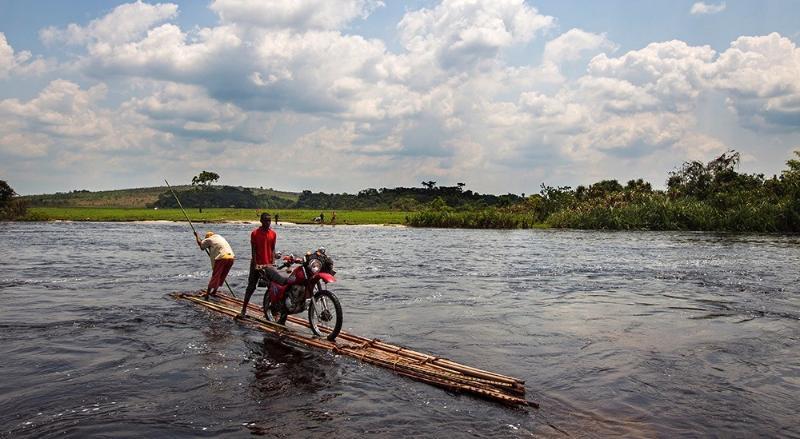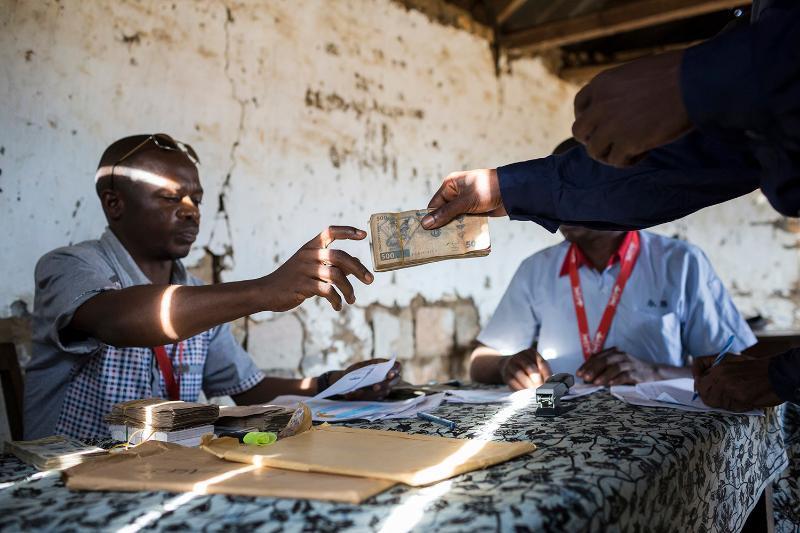It doesn’t get much harder than bringing bank accounts to poor people and small companies in the remotest parts of sub-Saharan Africa’s biggest country. But Trust Merchant Bank loan officers battle through bad roads, insurrections and pandemics to sign up 3 million new customers
It’s not easy to open a bank account in the Democratic Republic of Congo. It’s even harder to get a loan on good terms. Millions of people can’t even reach a bank branch in Congo. This lack of banking makes it difficult to raise a family, hold a job, start a business, send kids to school or buy necessities.
“In many African countries, most banks are serving only the larger companies, so we need to work harder to fill this gap,” says Markus Schulte, a loan officer at the European Investment Bank. “If banks want to serve rural people or really small firms, it’s tough. It requires a lot of work and is often seen as quite risky by the banks.”
The European Investment Bank recently signed a €20 million loan deal with a bank that has been trying hard for more than a decade and a half to expand banking to every corner of Congo. Trust Merchant Bank, also called TMB, is located in Lubumbashi in southeastern Congo and was created to offer retail banking to anyone of any income. It has grown quickly by operating in all financial sectors, including mobile banking and micro-loans for tiny companies.
Enormous need for support
“Congo is one of the poorest countries in the world, so there is an enormous need to support economic development,” says David McEvoy, a management advisor at Trust Merchant. His firm’s philosophy—to be a bank for everyone—will “ensure that Congo transitions out of an unstable period by offering a secure economy and a good livelihood for the people.”
Congo is the second-biggest country in Africa, slightly smaller than Algeria. It has nearly 90 million people and is expected to grow to nearly 195 million by 2050. The COVID-19 pandemic is creating even more economic and health challenges, on top of an Ebola outbreak in 2018.
To sign up new clients, Trust Merchant loan officers cross the country regularly, offering financing advice while asking people to open accounts. They use four-wheel-drive trucks and sometimes take armed guards, because, in addition to signing up new members, they distribute state workers’ monthly salaries. It’s common to camp overnight during the trip in areas with no light or electricity and to be stuck for a day because of steep dirt paths or fallen trees. Congo has only about 1,200 kilometers of good, paved roads, about a quarter of the number of good roads in the tiny country of Luxembourg. Millions of people in Congo have no access to transport, electricity or telephones.

A Trust Merchant Bank officer crossing a lake in Congo to offer savings accounts to new communities.
This outreach is worth it. Trust Merchant is now represented in all provinces, in many rural areas and cities, with dozens of branches. Its initial capital of $1.5 million in 2004 has grown to more than $100 million in equity today. It has 2.7 million bank accounts, and added 400,000 accounts during the pandemic. Sixteen years ago, when the bank began, there were only about 40,000 bank accounts in the country and most were held by wealth elites or expatriates, McEvoy says.
Urgent help during the pandemic
The European Investment Bank’s loan will enable Trust Merchant Bank to give several thousand loans of around $4,000 to $5,000 each to micro-firms and small businesses that need money to pay employees, buy supplies and cover other expenses during the pandemic. These companies will get loans with a fair interest rate, rather than the 30% to 40% interest a month they would pay to an “informal lender” in Congo. Sectors that will get new loans include food production, logistics, hospital care, small-scale information technology firms and farming.
“These sectors may not make a huge contribution to the gross domestic product of the country,” McEvoy says, “but they are a big help to the livelihood of the communities where people live.”
The EIB also intends to offer a loan guarantee of €30 million to give Trust Merchant Bank more power to approve new loans to small and medium-sized firms. The loan is part of the European Investment Bank’s rapid response package for the pandemic, and the guarantee would come from a European Union finance initiative for small companies. This assistance mainly will support TMB’s outreach efforts with thousands of small enterprises in Congo.
In total, the European Investment Bank is offering up to €200 million to help west and central Africa fight the crisis, especially targeting the private sector and small companies. The EU bank plans to mobilise more than €100 billion in investment in Africa this decade.
The European Investment Bank also signed a loan deal with Trust Merchant Bank in 2018 for €15 million.
“We are letting TMB give longer-term financing to more people across Congo,” says Schulte, the EIB loan officer. “The problem in some African countries like Congo is that banks often provide primarily short-term loans to their clients to give them working capital. With this new credit line, the EIB is helping TMB offer more lending for clients’ long-term capital investments. This is done by giving TMB long-term financing in addition to its short-term deposit financing that comes from their clients.”

Trust Merchant Bank officers also deliver state workers’ monthly salaries when they cross the country offering banking services.
There are many other benefits for Trust Merchant.
“Getting an EIB loan is a confidence-building measure,” McEvoy says. “By interacting with the EIB, we get access to technical assistance and knowhow. We build our human capacity, which is really in short supply in Congo. Having the EIB as a partner also encourages other institutions to reach out to us with new ideas and solutions.”
Building confidence is not always easy in this part of Africa.
“We have had everything thrown at us since we started – an attempted coup, rebel insurrection, the Ebola pandemic, the COVID crisis,” McEvoy says. “We have been stress-tested. But we’re optimistic. We couldn’t do this job without staying optimistic.”
